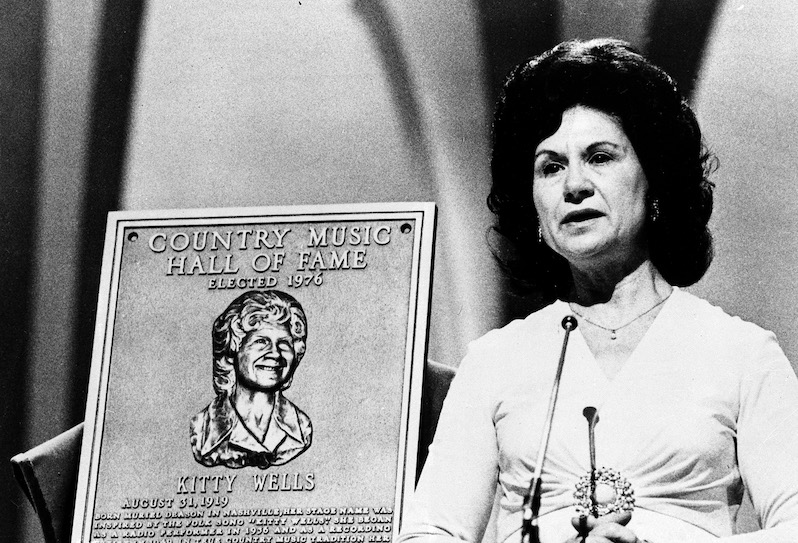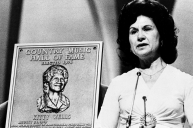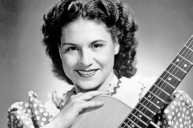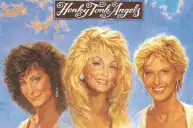Like so many of her peers, Country Music Hall of Fame member Kitty Wells, the stage name of Ellen Muriel Deason, was kin to multiple musical talents.
Wells needs little introduction, if only because the chart-topping success of 1952's "It Wasn't God who Made Honky Tonk Angels," an answer song to Hank Thompson's "The Wild Side of Life," paved the way for Brenda Lee, Patsy Cline, Tammy Wynette, Loretta Lynn, Dolly Parton and others crowned the the Queen of Country Music. Wells wasn't a one-hit wonder by any means, as she consistently appeared in the Top 10 between 1952 and 1965 and was a duet partner for fellow legends Webb Pierce and Red Foley. Additional solo hits included "Release Me" (1954), "Making Believe" (1955), "I Can't Stop Loving You" (1958), "Mommy For a Day" (1959) and "Heartbreak USA (1961). In 1991, she became the third country singer, after Roy Acuff and Hank Williams, and the eighth woman to receive the Grammy Lifetime Achievement Award.
The first woman with a No. 1 country hit gets her due, but what about the rest of her musically-inclined family? Read on to meet the rest of the Wells and Wright clan.
Johnnie Wright
Wells married fellow country star Johnnie Wright (misspelled Johnny Wright on some records) on Oct. 30, 1937. Wright was already a duet partner with brother-in-law Jack Anglin, and marriage opened the door for a second group: Johnnie Wright & the Harmony Girls, featuring Wells and Wright's sister (and Anglin's wife), Louise. Prior to marriage, Wells sang in a different family ensemble, The Deason Sisters, with her siblings.
Duo Johnnie & Jack became a regular touring and recording act until Anglin died in a car wreck on March 8, 1963. The pair is best known for the 1952 hit "Poison Love"—a factor in Johnnie & Jack becoming members of the Grand Ole Opry.
Wright found some solo success after Anglin's passing, scoring a No. 1 hit in 1965 with "Hello Vietnam" and recording autobiographical duet "We'll Stick Together" with Wells in 1968.
Wright's behind-the-scenes involvement in Nashville included a role in the formation of the Country Music Association and the building of the Country Music Hall of Fame and Museum.
Ruby Wright
By the late '60s, variety series The Kitty Wells-Johnnie Wright Family Show offered Wells' kids an invaluable platform. Yet while Ernest Tubb and others used their television reach to show off their young children's talents, the Wright family's kids were older, seasoned veterans of country music.
Oldest daughter Ruby (often billed as Ruby Wells to differentiate her from big-band singer Ruby Wright) sang with her parents from age 13. In addition to appearances on her parents' road show, Ruby recorded with the trio Rita, 'Nita and Ruby (with 'Nita being another famous daughter, Anita Carter) and with sister Carol Sue as The Wright Sisters.
As a solo artist, Ruby scored her lone Top 15 hit with 1964's "Dern Ya," her own answer song to Roger Miller's "Dang Me."
Ruby died a month before her 70th birthday on Sept. 27, 2009.
Bobby Wright
Despite scoring his own country hits, namely 1971's Top 15 entry "Here I Go Again," the Wright family's only son is known for something other than his Billboard chart history. Before Bobby chased Nashville stardom as a country music singer, he starred alongside Ernest Borgnine on the classic TV series McHale's Navy.
Under the stage name John Wright, Bobby appeared throughout the series (1962-1966) as guitar-strumming Southerner Willy Moss.
Read More: 'It Wasn't God Who Made Honky Tonk Angels' Paved the Way for Female Country Singers
Carol Sue Wright
Wells and Wright's youngest child scored a No. 11 hit in 1956 by appearing with her mom on a version of "How Far is Heaven."
Aside from recordings with her family, Carol Sue did not pursue a music career. Instead, she settled down in Tennessee and married Music Row executive John Sturdivant Sr., furthering the extended family's influence on country music history.




